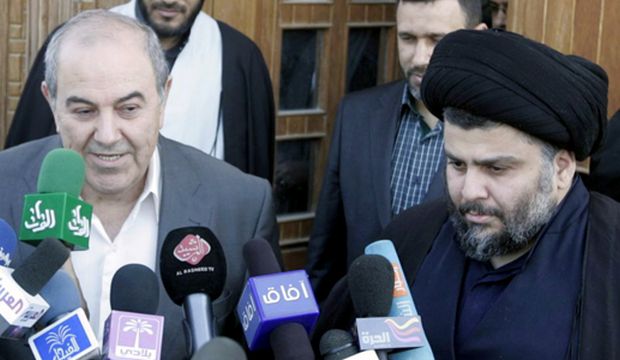
Iyad Allawi (L), Iraq’s vice president and head of the secular Iraqiya coalition, speaks during a joint news conference with Shi’ite cleric Moqtada Al-Sadr in Najaf, Iraq, on March 3, 2011. (Reuters/Ali Abu Shish)
Baghdad, Asharq Al-Awsat—Iraqi Vice-President Iyad Allawi has unveiled a deal with senior Shi’ite leader Moqtada Al-Sadr to form a “supra-sectarian and ethnic” bloc in the Iraqi parliament, one week after the killing of a prominent Sunni sheikh threatened to exacerbate sectarian tensions in Iraq.
In an exclusive interview with Asharq Al-Awsat, Allawi, who is also leader of the Al-Wataniya bloc in the Iraqi parliament, said: “A delegation from the Sadrist Al-Ahrar bloc visited me in my office where we discussed and agreed to form the Wataniya Front which will begin work in the Iraqi parliament and government in the next few days . . . to rescue Iraq from factional and political conflicts.”
The new bloc will not operate along sectarian or ethnic lines but rather “according to the honor code called for by Moqtada Al-Sadr,” the official added.
In a gesture of goodwill the prominent Shi’ite cleric earlier this week said he would freeze militias affiliated with the Sadrist Movement after a prominent Sunni tribal leader, Sheikh Qassem Al-Janabi, and his son were abducted and killed by suspected members of Shi’ite volunteer militias.
Two main Iraqi parliamentary blocs suspended their activities in parliament last week in protest against what they described as Prime Minister Haider Al-Abadi’s failure to disarm such militias.
Sadr has also called on the Al-Ahrar bloc to sign with other parliamentary blocs an honor code aimed at stemming the bloodletting in Iraq.
Allawi praised the moves by Sadr to freeze the activities of a number of armed groups affiliated with the Sadrist movement, saying it was a sign of Sadr’s patriotism and “positive efforts to safeguard the social unity of Iraq.”
“We have expressed our support to this trend which is aimed at distancing Iraqis from sectarian politics and achieving true national unity,” he added.
In comments to Asharq Al-Awsat Al-Ahrar MP Dhia Al-Assadi said the new Wataniya Front would help “bring together political leaders and influential figures from the Iraqi parliament on the basis of national commonalities.”
“The bloc will be supra-sectarian, ethnic and work according to a purely national agenda,” Assadi said.
He added: “The idea for the Front began almost two months ago and it was being circulated between the Al-Ahrar bloc and some parliamentary figures, including Iyad Allawi. Everyone was aware of the significance of forming the Front on national principles removed from narrow partisan agendas.”
